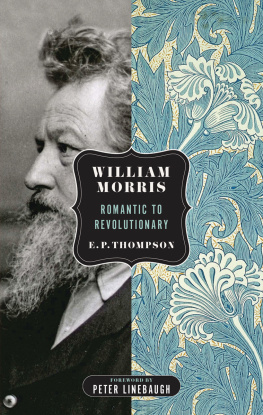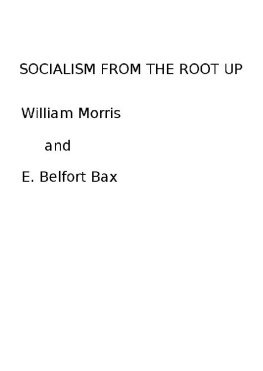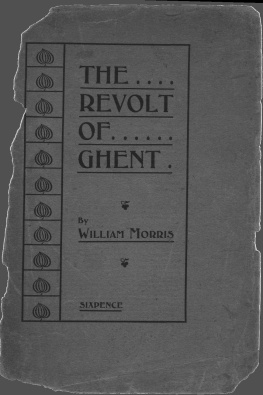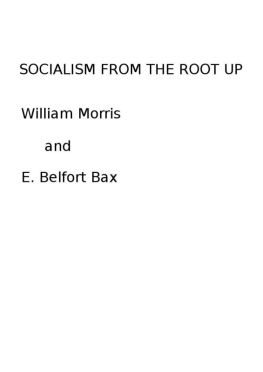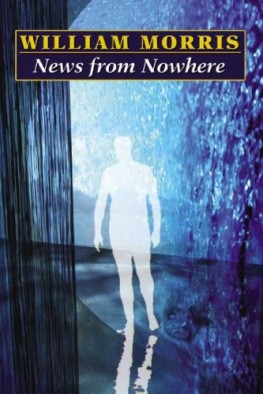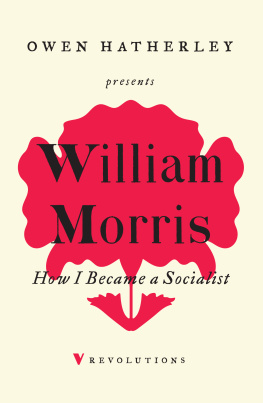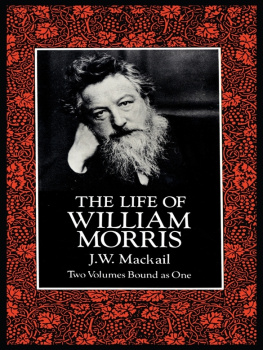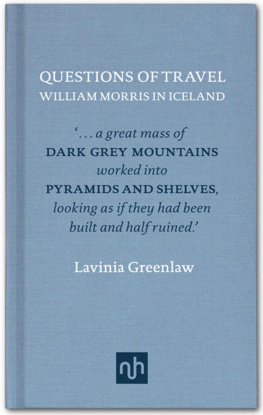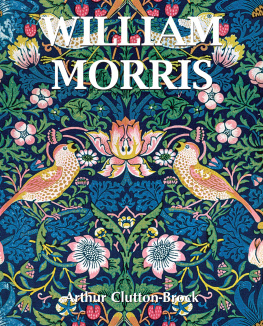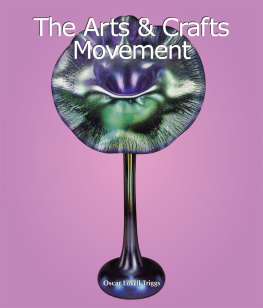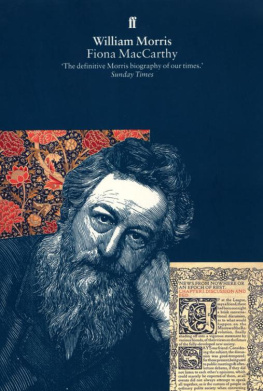Two impressive figures, William Morris as subject and E.P. Thompson as author, are conjoined in this immense biographical-historical-critical study, and both of them have gained in stature since the first edition of the book was published . The book that was ignored in 1955 has meanwhile become something of an underground classicalmost impossible to locate in second-hand bookstores, pored over in libraries, required reading for anyone interested in Morris and, increasingly, for anyone interested in one of the most important of contemporary British historians. Thompson has the distinguishing characteristic of a great historian: he has transformed the nature of the past, it will never look the same again; and whoever works in the area of his concerns in the future must come to terms with what Thompson has written. So too with his study of William Morris.
Peter Stansky, The New York Times Book Review
An absorbing biographical study. A glittering quarry of marvelous quotes from Morris and others, many taken from heretofore inaccessible or unpublished sources.
Walter Arnold, Saturday Review
Thompsons is the first biography to do justice to Morriss political thought and so assemble the man whole . It is not only the standard biography of Morris; it makes us realize, as no other writer has done, how completely admirable a man this Victorian washow consistent and honest to himself and others, how incapable of cruelty or jargon and, above all, how free.
Robert Hughes, Time magazine
Edward Thompson is our finest socialist writer todaycertainly in England, possibly in Europe. Readers of The Making of the English Working Class, or indeed Whigs and Hunters, will always remember these as major works of literature. The wonderful variety of timbre and rhythm commanded by Thompsons writing at the height of its poweralternatively passionate and playful, caustic and delicate, colloquial and decoroushas no peer on the Left. Arguably, too, the strictly historical achievement of the series of studies that extends across the 19th and 18th centuries from William Morris to the rich group of recent essays whose collection is promised in Customs in Common is perhaps the most original product of the corpus of English Marxist historiography to which so many gifted scholars have contributed . Throughout, his has been the most declared political history of any of his generation. Every major, and nearly every minor, work he has written concludes with an avowed and direct reflection on its lessons for socialists of his own time. Each of these texts has been in its own way a militant intervention in the present, as well as a professional recovery of the past. At the same time, these works of history have also been deliberate and focused contributions to theory: no other Marxist historian has taken such pains to confront and explore, without insinuation or circumlocution, difficult conceptual questions in the pursuit of their research. The definitions of class and class consciousness in The Making of the English Working Class; the critique of base and superstructure through the prism of law in Whigs and Hunters; the reinstatement as disciplined imagination of utopianism in the new edition of William Morrisall these represent theoretical arguments that are not mere enclaves within the respective historical discourses, but form rather their natural culmination and resolution.
Perry Anderson

Editor: Sasha Lilley
Spectre is a series of penetrating and indispensable works of, and about, radical political economy. Spectre lays bare the dark underbelly of politics and economics, publishing outstanding and contrarian perspectives on the maelstrom of capitaland emancipatory alternativesin crisis. The companion Spectre Classics imprint unearths essential works of radical history, political economy, theory and practice, to illuminate the present with brilliant, yet unjustly neglected, ideas from the past.
Spectre
Greg Albo, Sam Gindin, and Leo Panitch, In and Out of Crisis: The Global Financial Meltdown and Left Alternatives
David McNally, Global Slump: The Economics and Politics of Crisis and Resistance
Sasha Lilley, Capital and Its Discontents: Conversations with Radical Thinkers in a Time of Tumult
Spectre Classics
E.P. Thompson, William Morris: Romantic to Revolutionary
Introduction: 2011 PM Press/Peter Linebaugh
William Morris: Dorothy Thompson 1955, 1976
This edition 2011 PM Press and Merlin Press
All rights reserved. No part of this book may be transmitted by any means without
permission in writing from the publisher.
ISBN: 978-1-60486-243-0
Library of Congress Control Number: 2010927785
Cover: John Yates
10 9 8 7 6 5 4 3 2 1
PM Press
PO Box 23912
Oakland, CA 94623
www.pmpress.org
Printed in the USA on recycled paper.
Published in the EU by The Merlin Press Ltd.
6 Crane Street Chambers, Crane Street, Pontypool NP4 6ND, Wales
www.merlinpress.co.uk
ISBN: 978-0-85036-680-8
CONTENTS
FOREWORD TO THE 2011 EDITION
Peter Linebaugh
I
GIVEN the overall pollution of the seas, the land, the atmosphere, as well as the geological layers beneath the seas, the world, considered as a chemical organization, is undergoing an inversion. Dangerous gases derived from beneath the seas are being consumed on earth and elevated into the atmosphere with dire consequences for the biological organization of the world. As Rebecca Solnit points out, it is the world turned upside down, although that is not what is commonly meant by the phrase, which was always egalitarian and anti-imperial. Formerly it described spiritual and political revolutions; St. Paul was accused of turning the world upside down when he preached universally to allGreeks, Jews, men, womenin Thessalonica (Acts 17:6) and supposedly it was the name of the tune played at Cornwalliss surrender at Yorktown which achieved American independence (all men are created equal).
As egalitarian and anti-imperial, E.P. Thompson and William Morris were both communists, and we need communists now as never before. But what does the term mean? I shall try to provide an approach that relies on the commons, its cognate.
As a founder of an anti-capitalist, revolutionary, working-class organization Morris had to come up with definitions suitable for a political programme: Well, what I mean by Socialism is a condition of society in which there would be neither rich nor poor, neither master nor masters man, neither idle nor overworked, neither brain-sick brain workers, nor heart-sick hand workers, in a word, in which all men would be living in equality of condition, and would manage their affairs unwastefully, and with the full consciousness that harm to one would mean harm to allthe realization at last of the meaning of the word COMMONWEALTH. and alienation of labour violate human solidarityare derived from the struggles of the early industrial revolution as we have come to know them thanks to E.P. Thompsons narrative, The Making of the English Working Class (1963). The only point that is distinctly that of Morris is the demand for unwaste. This is what makes his communism green.
We sense the green again when Morris loses his temper: It is a shoddy age. Shoddy is king. From the statesman to the shoemaker all is shoddy he exclaimed to a reporter. Then you do not admire the common sense John Bull, Mr. Morris? John Bull is a stupid, unpractical oaf, Morris replied. At a calmer moment he said, Apart from the desire to produce beautiful things, the leading passion of my life has been and is hatred of modern civilization. That hatred stems from a repugnance of all that was squalid, stupid, dull, and hateful in capitalism and it led to its repudiation root and branch. Morriss anti-capitalism was nurtured by his study of the romantic poets and to show this is one of Thompsons achievements.
Next page
